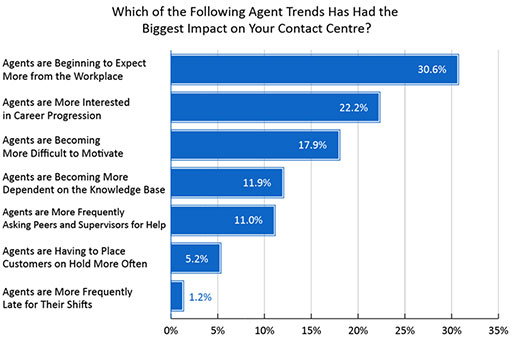We present some interesting ideas for how you can better prepare contact centre agents for team leadership positions.
First Things First, Spot the Right People
There is a belief that really great agents will make really great leaders. That is the number-one mistake in this arena, according to Justin Robbins, Chief Evangelist at CX Effect.

“Try to create the ‘perfectly imperfect’ team. If you have a whole host of leaders and the thing that they all have in common is that they were all great agents, you are going to have lopsided development within your organization,” says Justin.
“You are not going to have a diverse set of perspectives on how you make decisions and lead your teams.”
So, before you think about who you are going to promote, go through a list of attributes that you believe are really important to have within your supervisors.
The Right Team Leader Attributes
The attributes that you look for will depend on the nature of your organization and contact centre. For example, if the main responsibility for supervisors is:
- Coaching and development – You’ll want to promote people who you can develop to spot areas of opportunity within your teams.
- Creating reports – You’ll want to promote people who are more analytical and can dig into data to see what the trends mean and make decisions.
Maybe you want a supervisor who is really good at de-escalating customer situations. In this scenario, it is easy to see why you’d want somebody who was a really great advisor.
“What you really want is frontline employees who are really good at de-escalating customer situations and leaders who are able to develop those skills in them. These aren’t mutually exclusive,” says Justin Robbins.
The biggest attribute is attitude. You want an energetic leader who inspires people. You can train in the important skills with a good development plan or leadership scheme…
For more on the qualities of a great leader, read our article: Team Leadership: What Makes a Great Leader?
Create a Leadership Scheme
Once you’ve spotted the right people, consider the moves they can make to prepare for positions of leadership.
Create an engaging journey for advisors to follow, thinking through: what are the milestones and the achievements? How can advisors earn their credentials?

Natalie Calvert, Founder of CX High Performance, suggests: “Create a leadership scheme. That way you can trial different advisors’ approach to different leadership-related tasks, test them out and you can expose them to different situations.”
This can be a great way to almost gamify the leadership development, with tasks that can benefit the contact centre – if you design your leadership scheme modules wisely.
Giving chosen advisors a couple of hours a week to spend time working on “in-house” qualifications not only can prepare them for every aspect of the role but can also benefit the contact centre in the short term too.
You can also create development schemes for other positions, if you spot potential in amongst your advisors. These positions could be in resource planning, quality assurance or training, for example.
Develop a Modular Training Scheme
In your leadership scheme, there are a number of areas which you can turn into modules. These modules will have a set of exercises which advisors can complete.
It could take a year or two for an advisor to complete all your modules, as they are designed not only to provide advisors with the necessary skills, but also to satisfy their desire for career development.

Modules will depend on the typical duties of your team leaders, which will vary from contact centre to contact centre.
But possible suggestions for modules are listed below, with a number of tasks that advisors can complete in order to pass the module.
Leadership Skills
There are many important leadership skills, such as motivation, delegation and taking responsibility. Think about which matter most in respect to your team leader role and create tasks like:
- Plan for and track the progress of a new process/procedure implementation
- Delegate certain responsibilities of this new process to other advisors and explain the choices
- Create a fun video which features everybody in the team
Communication Skills
Clearly communicating to advisors what is expected from them and how they can continue to thrive is key. Here are some exercises that will help to develop these skills.
- Lead a lunch and learn around a valuable customer service skill (e.g. empathy, listening)
- Undergo training for how to give constructive feedback
- Lead a certain number of 1-2-1s with new advisors
Personal Development
Fostering good relationships with advisors is key to getting the best out of individuals. A leader must have this ability and these activities will enable them to try out this skill.
- Buddy up with a new starter and track their progress
- Run an emotional resilience workshop
- Show understanding of the QA scorecard and participate in calibration sessions
Performance Improvement
In many contact centres, the primary focus for a leader is to develop the performance of their team. Here are some exercises that could prepare them for that responsibility.
- Handle a certain number of call escalations
- Create a plan for how to increase motivation
- Run an advisor focus group to uncover some key process issues
Culture and Community
A high-performing team engages with one another and shares key learnings. A successful leader will build a community, and here are some exercises that will sharpen their skills for doing so.
- Spend 10 hours volunteering for a local charity
- Develop a new employee listening mechanism and pass ideas to managers
- Undergo mental health and well-being training
Reward and Recognition
A good leader is seen as a fair leader, who recognizes good performance across the team and celebrates successes. Here are some ideas for a reward and recognition module.
- Develop a prospective new incentive system, with a strict budget
- Design a new motivational game
- Undergo “strength spotting” training
Accountability
You want advisors not only to find and implement good solutions, but to have confidence in coming up with them. These exercises will help build this confidence.
- Undergo scenario training – answer: “What would you do when…?” situations
- Demonstrate an understanding of compliance, security and fiduciary responsibilities
- Create an action plan for developing trust amongst the team
Company Knowledge
Potential team leaders should communicate with a variety of colleagues and build knowledge of who can support them with what before taking on the team leader role. The following exercises will help.
- Lead a team huddle and share information from the top down
- Spend a day with other departments to see how they operate
- Be coached on internal processes they need to know
Open Up a Discussion Around Key Leadership Challenges
For a role in which you mix task delivery with people leadership, it is only natural to come across any number of challenges. Some classic examples include:
- Spending too much time handling escalated calls
- Spending too much time answering emails
- Being concerned about maintaining friendships with former fellow advisors
A team leader should have an understanding of key challenges – like these – that they are likely to face and understand some solutions for how these problems can be mitigated.
To achieve this, before stepping into the role of a team leader, individuals should have a meeting with other team leaders about some of the problems they have had to face and how to deal with them.
These sessions help to nurture a strong bond between team leaders, so they continuously learn from one another and share best practices for coaching, reporting and handling tricky scenarios.
Also, it is a good way to ensure consistency of leadership, helping to ensure there are no mixed messages being spread across the contact centre.
Offer Support Throughout the First Six to Twelve Months
A team leader’s development plan shouldn’t end once they are given the role. It should continue until at least the end of their first six months on the job.
In this time, give the team leader a mentor – a senior team leader who exemplifies everything that you want your contact centre to be about – who they can have regular catch-ups with.
With the senior leader, encourage the new team leader to open up about any challenges they have already faced and have the senior leader share best practices with them.
Also, consider how you will measure the success of the team leader within that first six-month period? Look at things like:
- Their team’s quality scores and feedback from customers
- Their team’s rates of absence and possibly attrition
If you sense that a team leader is struggling, talk to them, show them your support and your willingness to help out, if they want some advice.
3 More Quick Ideas
If the challenge of creating a fully-fledged development programme is a little intimidating, there are smaller steps that you can take to prepare future team leaders.
1. Provide Step-In Opportunities
After some basic team leader training, you can provide advisors who you identify to be future leaders with the opportunity to “step in” for a day, a couple of days or even a week.

“I worked in a contact centre where – if there was a team leader that had a week’s leave, for example – those people who had been identified as potential future leaders would then have the opportunity to step in,” says Jacqui Turner, the Founder of Turner Corner Learning Solutions.
“You could see it building the confidence of each individual and, when it was time to take on the role full-time, they had already had that practical experience.”
Doing this also gives the talented employee the sense that they are moving forward and that there is a future for them within the contact centre.
2. Offer Pet Projects
Earlier, we presented numerous ideas of little projects that advisors can take on to improve their team leadership skills, while highlighting possible modules within a “team leadership graduation scheme”. These included:
- Hosting lunch-and-learn sessions
- Creating a video with the team
- Managing the implementation of a new process/procedure
These projects can help future team leaders to develop skills that are necessary for the team leader role, and current team leaders can help out to point them in the right direction.
Also, when you engage advisors in activities like this, you learn more about their existing skills and interest. You can then think about how you can further utilize these within their current role, as well as for when they reach the team leader position.
3. Pair Up Potential Leaders With New Starters
A good leader not only considers how they can develop themselves, they also think about how they can develop the team around them.
With this in mind, it is good to observe how potential team leader candidates help to nurture their fellow advisors. A buddy scheme provides a good opportunity to do so.
Having a buddy scheme that pairs up potential team leaders with new advisors will help you to understand how they help others and build confidence within their teammates.
When a new starter has a problem, consider the approach the potential leader takes in stepping in and resolving it. What do they then do to support the advisor so they are better prepared next time?
For quick-fire ideas like this, read our article: 10 Tips for Preparing Agents for Team Leadership
To find out lots more ideas for training team leaders, read our articles:
- Train Team Leaders Well
- Top Tips to Make Your Team Leaders More Productive
- 3 Ways to Develop Contact Centre Leadership at Every Level
Author: Charlie Mitchell
Reviewed by: Robyn Coppell
Published On: 9th Jun 2021 - Last modified: 9th Jan 2026
Read more about - Call Centre Management, Charlie Mitchell, Editor's Picks, Jacqui Turner, Justin Robbins, Leadership, Management Strategies, Natalie Calvert, Team Management















